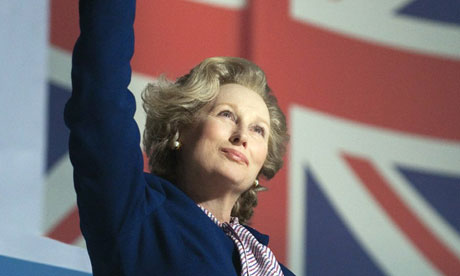A film which attempted to be so much, has wound up being confused and even regressive
The most provocative and talked about film of the month has
undoubtedly been The Iron Lady. Was
it too lacking in political content? Was it distasteful in its depiction of Margaret
Thatcher in dementia? Was it hagiographic or an offensive representation of the
longest serving post-war Prime Minister? My major question when I came out at
the end, however, was “What is it?”
Let us be frank: the film has publicised itself as a film
about the political life of Margaret Thatcher, trading on her struggle to
become Britain’s first female prime minister and referencing famous events from
her administration, such as the Falklands War. However, there isn’t much of
this in the finished film and her political life is dealt with very thinly. So,
strangely, it doesn’t feel like a film about Margaret Thatcher’s political
life.
What you do get is an awful lot of Thatcher as an old woman.
Now, dementia and old age is of course a very powerful subject and has been
covered very poignantly by many films. However, Margaret Thatcher’s dementia is
pretty much the least interesting thing about her. It certainly does nothing to
enhance our understanding of her extraordinary achievements by looking at it
through the perspective of a fairly deranged old person. The major focus on
this then is very curious indeed.
So, is it a film about dementia in the same way that Iris perhaps was? Well, no. It doesn’t
really say anything about the condition at all. The mental disintegration is
just there, and one does get the sense that one is being most definitely manipulated
by its use into sympathising with the most divisive post-war Prime Minister. It
is hard to see the use of the condition as, at best, lazy or, at worst,
cynical.
Is it then a feminist film about the woman who broke down
barriers to become Britain’s first woman Prime Minister? Absolutely not, and at
this point I will warn of spoilers. There are sections devoted to Margaret
Roberts’ struggle to get into politics and her young romance with Denis
Thatcher. It is one of the film’s better sections, but it features a line in it
when the woman who would become PM says: “One’s life must matter Denis. I
cannot die washing up a tea cup.”
At the end of the film, the very elderly Margaret, with
Denis long dead and her children living their own lives, stands alone in her
kitchen washing up a tea cup and hearing the sounds of the family life that she
never really had, as she imagines Denis starting up the car and the children
laughing in the garden.
There is a subtext to that moment which is incredibly
regressive. For a film which has actually glossed over Thatcher’s political
life and failed to give it due credit for the extraordinary and important
achievement it was for women in Britain to end on a scene which seems to
suggest, in part, that, when all was said and done, she rather wished she had
stayed at home and done the washing up is just insulting.
A harsh reading of the film? Perhaps, but it is
possible given how weakly it dealt with its central character and her legacy.
That central character is brilliantly performed by Meryl Streep, and she
deserves the Oscar absolutely, but it is a failure of a film which attempts to
be everything and winds up being nothing.

I wonder whether you read too much into it. Just because she "imagines Denis (not Dennis, as you write) starting up the car and the children laughing in the garden", does not necessarily mean that she regrets that she gave up an ordinary life for an extraordinary one. The defining characteristic of Lady Thatcher has always been her unflagging determination and I doubt she ever seriously regretted her life choices. She was/is simply not that sort of person.
ReplyDeleteI have now come to the conclusion that The Iron lady was concocted as a vehicle for Meryl Streep. If you have the time, here's my reaction after seeing it last month:
ReplyDeletehttp://westernindependent.blogspot.com/2012/01/phyllida-lloyds-iron-lady.html